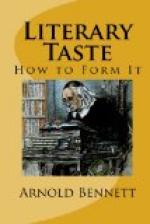What causes the passionate few to make such a fuss about literature? There can be only one reply. They find a keen and lasting pleasure in literature. They enjoy literature as some men enjoy beer. The recurrence of this pleasure naturally keeps their interest in literature very much alive. They are for ever making new researches, for ever practising on themselves. They learn to understand themselves. They learn to know what they want. Their taste becomes surer and surer as their experience lengthens. They do not enjoy to-day what will seem tedious to them to-morrow. When they find a book tedious, no amount of popular clatter will persuade them that it is pleasurable; and when they find it pleasurable no chill silence of the street-crowds will affect their conviction that the book is good and permanent. They have faith in themselves. What are the qualities in a book which give keen and lasting pleasure to the passionate few? This is a question so difficult that it has never yet been completely answered. You may talk lightly about truth, insight, knowledge, wisdom, humour, and beauty. But these comfortable words do not really carry you very far, for each of them has to be defined, especially the first and last. It is all very well for Keats in his airy manner to assert that beauty is truth, truth beauty, and that that is all he knows or needs to know. I, for one, need to know a lot more. And I never shall know. Nobody, not even Hazlitt nor Sainte-Beuve, has ever finally explained why he thought a book beautiful. I take the first fine lines that come to hand—
The woods of Arcady are dead,
And over is their antique joy—




